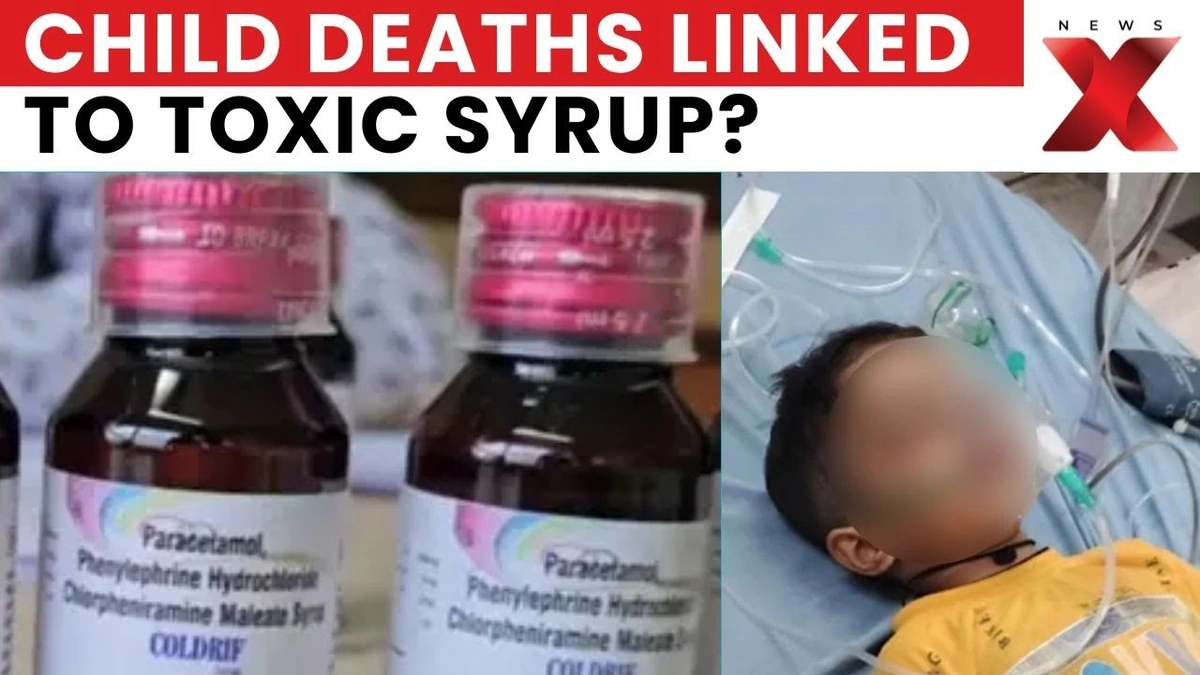Madhya Pradesh and Rajasthan: What We Know About the Toxic Cough Syrup Deaths
Okay, let’s talk about something that’s been making headlines and, frankly, should be a cause for serious concern: the recent reports of toxic cough syrup deaths in Madhya Pradesh and Rajasthan. It’s not just a news story; it’s a wake-up call. What fascinates me – and scares me – is how something meant to soothe can turn deadly. We’re not just talking about a bad batch; we’re diving into a systemic problem that demands answers. And while investigations are ongoing, here’s what we know and, more importantly, why it matters to you, especially if you or your family use these medications.
The Disturbing Details | What Happened?

So, what exactly went down? Reports started surfacing about children falling ill after consuming cough syrups. Tragically, several deaths have been linked to these syrups, prompting immediate investigations. The main culprit? Allegedly, the presence of diethylene glycol , a toxic substance, in some cough syrup batches. This isn’t a new problem; we’ve seen similar incidents in other parts of the world. But the fact that it’s happening here, in India, is deeply troubling. It raises questions about quality control, regulatory oversight, and the safety of medications we often take for granted. And that is really a problem, because safety should be paramount in pharmaceutical production.
I initially thought this was an isolated incident, but then I realized the scale of the problem. We’re talking about two states, potentially impacting countless families. The emotional toll of such tragedies is unimaginable, and it underscores the urgent need for preventative measures. The government’s response has been swift, with investigations launched and production licenses suspended. But is it enough? What long-term solutions are being considered to prevent this from happening again?
Diethylene Glycol | The Silent Killer in Cough Syrups
Let’s be honest, most of us don’t think twice about the ingredients in our cough syrup. We trust that what we’re buying is safe. But diethylene glycol? That’s not something you want anywhere near your medicine. It’s a toxic alcohol used in industrial applications like antifreeze. Its presence in cough syrups is a clear indication of either negligence or, worse, deliberate adulteration. The consequences of ingesting diethylene glycol are severe, leading to kidney failure, neurological damage, and, in the worst cases, death, especially in children. That said, what are the regulatory bodies doing to ensure this never happens? And what should we, as responsible consumers, be looking out for?
What fascinates me is the vulnerability this exposes. People trust that medicines are safe, and when that trust is broken, the impact is devastating. But, let’s rephrase that for clarity, it isn’t that medicines are unsafe, its that some manufacturers are cutting corners.
The Regulatory Labyrinth | Why Are Toxic Syrups Still Reaching Consumers?
The million-dollar question: how do these toxic syrups even make it to the market? India has a complex regulatory system for pharmaceuticals, with various agencies responsible for licensing, manufacturing, and quality control. But clearly, something is falling through the cracks. The investigation needs to go beyond just identifying the culprits; it needs to examine the entire supply chain. Are there loopholes in the system that allow unscrupulous manufacturers to bypass regulations? Is there adequate oversight and enforcement? The answer is probably no, because we’ve already seen this happen before. In fact, a big part of it could be because of the amount of corruption present at various levels in the system.
What’s truly concerning is the potential for counterfeit or substandard drugs to flood the market, particularly in rural areas where access to healthcare is limited. These areas are more vulnerable, because there is limited supply chain oversight. This isn’t just a matter of economics; it’s a matter of life and death. And it demands a comprehensive overhaul of the regulatory framework, coupled with stricter enforcement and accountability.
What Can You Do? A Practical Guide for Concerned Consumers
So, what can you do to protect yourself and your family? First and foremost: be vigilant. Always check the label of any medication you’re buying. Look for reputable brands and verify the manufacturer’s information. If something seems off – the packaging is damaged, the seal is broken, or the price is suspiciously low – don’t buy it. Purchase medicines only from licensed pharmacies and avoid buying from unverified sources, especially online. When in doubt, consult your doctor or pharmacist. According to the Indian Pharmacopoeia Commission , all drugs have to meet a certain standard, so it’s important to buy drugs that are certified.
Here’s the thing: don’t be afraid to ask questions. Demand transparency from your healthcare providers and pharmacists. Ask about the source of the medication, its ingredients, and any potential side effects. Educate yourself about drug safety regulations and report any suspected counterfeit or substandard drugs to the authorities. And what fascinates me is that sometimes, its the simple things that can make all the difference. Just being vigilant can help.
A common mistake I see people make is assuming that all medicines are created equal. They aren’t. Quality control varies, and it’s your responsibility to be informed and proactive. Let’s be honest, sometimes, we’re too trusting. We assume that the system will protect us. But as this tragedy shows, we need to be our own advocates.
Beyond the Headlines: The Long-Term Implications of the Cough Syrup Tragedy
This isn’t just a one-off incident; it’s a symptom of a larger problem. The toxic cough syrup deaths in Madhya Pradesh and Rajasthan have exposed vulnerabilities in India’s pharmaceutical industry and regulatory system. The long-term implications are far-reaching, potentially eroding public trust in the healthcare system and undermining efforts to improve public health. This is something that everyone should be concerned about.
To prevent future tragedies, India needs to invest in strengthening its regulatory capacity, improving quality control standards, and enhancing surveillance and enforcement mechanisms. This includes increasing funding for drug testing laboratories, training more inspectors, and implementing stricter penalties for manufacturers who violate regulations. Additionally, there needs to be greater public awareness about medication safety and the risks of counterfeit or substandard drugs. That said, this is a long road ahead.
And so, this incident highlights the importance of pharmaceutical oversight and stringent regulatory control. In fact, the consequences could be far reaching if actions are not taken immediately.
FAQ | Your Burning Questions Answered
Frequently Asked Questions
What specific symptoms should I watch out for after taking cough syrup?
Watch for nausea, vomiting, abdominal pain, and decreased urination. Seek immediate medical attention if these occur.
How can I verify the authenticity of a cough syrup?
Check for proper labeling, sealed packaging, and purchase from licensed pharmacies only. Verify the manufacturer online.
What should I do if I suspect a cough syrup is contaminated?
Stop using it immediately and report it to your local drug regulatory authority.
Are there specific brands of cough syrup I should avoid right now?
Authorities have issued advisories. Stay updated through news and official health websites for specific brand recalls.
How can I dispose of unused or recalled cough syrup safely?
Return it to the pharmacy or follow local guidelines for disposing of hazardous waste.
So, the deaths linked to cough syrups are more than a news item; they’re a call to action. It requires vigilance from the public and a commitment to safety from all stakeholders. And hopefully, with these changes, we won’t have any incidents in the future.













